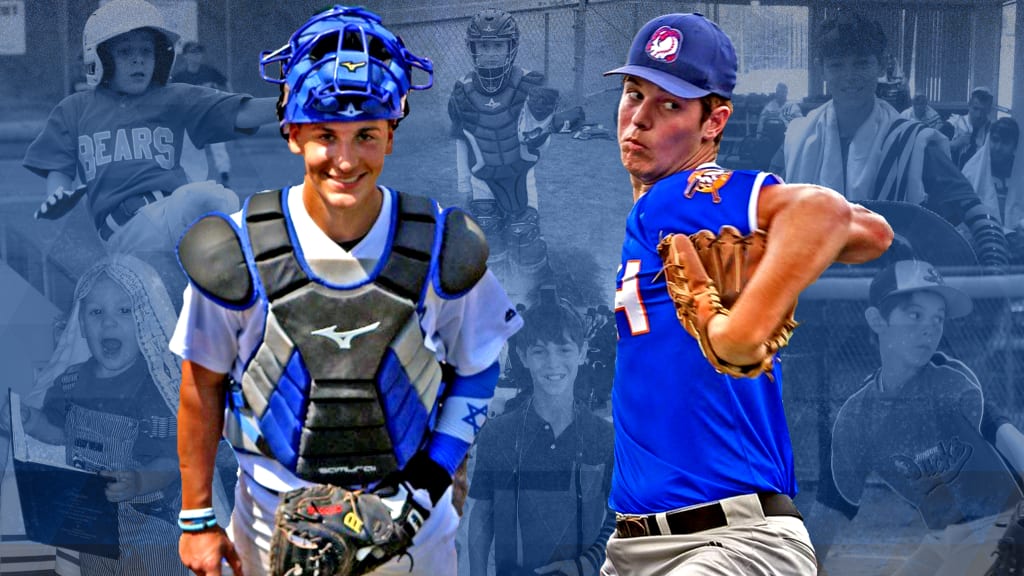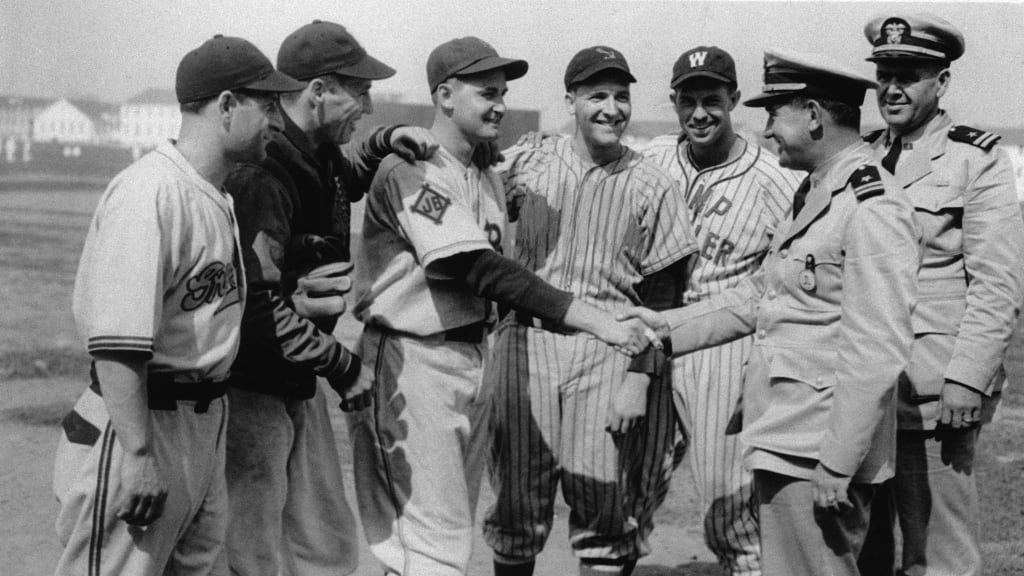
When Jacob Steinmetz was drafted in the third round by the Arizona D-backs and Elie Kligman was selected by the Nationals in Round 20, they became the first Orthodox Jews to ever get drafted, dating back to 1965.
To understand why this is so exciting, some historical context is necessary.
The history of Jews in the United States has been intertwined with baseball for decades. When my ancestors came through Ellis Island and saw the Statue of Liberty’s message, penned by Emma Lazarus -- “Give me your tired, your poor, your huddled masses yearning to breathe free.” -- one of the quickest ways these newest Americans were able to breathe free and feel, well, American, was through the game of baseball. That’s why, for our people, it always has been, and always will be the national pastime.
With that embracing of the game, however, has come a certain measure of assimilation. Immigrants often gave up parts of who they were to fit in, and that included players who were good enough to make it to the Major Leagues. As MLB historian John Thorn wrote in his essay, “Overcome Adversity,” which originally appeared in the book Chasing Dreams: Baseball & Becoming American, names were often changed to avoid the hatred that sometimes came with being outwardly Jewish.
“Sammy Bohne and Phil Cooney were also born as Cohen, as were Harry Kane and Reuben Ewing,” Thorn wrote. “Jesse Baker was born Michael Silverman. Henry Lifschutz became Henry Bostick. Joe Rosenblum became Joe Bennett. James Herman Soloman became Jimmie Reese.”
“There must have been at least half a hundred Jews in the game but we’ll never know their real names,” Ford Frick wrote in 1925. “During the early days of this century the Jewish boys had tough sledding in the majors and many of them changed their name.”
Hank Greenberg helped change that narrative, with his willingness to stand up to any name-calling and his ability to mash home runs. Sandy Koufax was a hero on two coasts, and the tale of his sitting out Game 1 of the 1965 World Series will be passed on from generation to generation like the story of the Jewish exodus from Egypt is re-told each Passover.
In today’s game, it’s not unusual to have Jewish players in the big leagues. Though the current Jewish baseball fan likely knows what Alex Bregman is up to or when Ryan Lavarnway gets called up, Thorn argues that it’s more something noted rather than truly celebrated like it was in the days of Koufax.
“It is today routine, rather than remarkable, for Jews to be baseball players -- stars and supernumeraries just like every nationality or creed,” he wrote. “Is that a triumph? Yes, but it is also a challenge. What are those things that make Jews special -- chosen, even -- if not their outsider status? What will drive us to prove our people’s individual excellence, by ourselves or through our heroes? As a people forged in adversity, America’s Jews will have to find something else to supply the tie that binds. As in the past, baseball will be a help.”
Thorn wrote that back in 2014, but his words appear prescient when you consider the 2021 Draft, and Steinmetz and Kligman.
Fans will have to wait to see both play professionally. Steinmetz signed with Arizona, but Kligman opted to head to Wake Forest to begin his college career. Even so, what transpired on Days 2 and 3 of the Draft earlier this month is nothing short of remarkable.
“At first, it was kind of just like, that's who I am, who I've always been,” said Steinmetz, a right-handed pitcher from New York who raised his stock by pitching at the Elev8 Academy in Florida this spring. “But once I did get taken, and I had all these people reaching out, and everyone's … showing a lot of support and stuff like that. And I'm just getting random emails from people that I didn't even know existed or from wherever in the world. And just knowing that most of the Orthodox Jews have my back and are supporting me, it was just, it was a great feeling.”
This goes beyond just a couple of Jewish players getting drafted. While most Jewish players have embraced that part of their identity, with many going to play for Team Israel in the World Baseball Classic and currently in the Olympics, very few have been observant. Being orthodox means keeping kosher and not doing things like riding in cars or answering phones on the Jewish Sabbath, which runs from sundown on Friday to sundown on Saturday. Steinmetz will play during that time, but he will have to be able to walk to and from the stadium, while Kligman has grown up not playing and will continue that practice in college and beyond.
Should either Steinmetz or Kligman get to the big leagues, neither would be the first observant Jew to reach the highest level. Morrie Arnovich, who was said to have kept kosher for his entire career, and sat out 1940 World Series games on Rosh Hashanah, was an All-Star and played 10 years. The difference now, it seems, is that these players are being celebrated and both of them report getting nothing but support during high school and now, beyond. Steinmetz said the D-backs are working with him to figure out how to adjust to his needs and Kligman, a Las Vegas native, hasn’t experienced much in the way of opposition to his beliefs.

“I've pretty much had the same exact experience,” Kligman said. “Mostly people that are really just curious and wanting to learn about what we do on [the Sabbath] and what we do on holidays, what we can, what we can’t eat. I've had people that are super interested in here, they've come join us for Friday night dinner. But all of our experiences have been positive for me.”
There are all kinds of Jews around the world, with varying degrees of observance. And suffice it to say, the more secular and the more observant haven’t always seen eye-to-eye on everything. But with the drafting of Steinmetz and Kligman, there has been no difference of opinion.
“My dad said you'd have Hasidic people reaching out and not religious people reaching out, just like kind of all over the spectrum of Judaism,” Steinmetz said. “It kind of seems like me and Elie, just being able to get to where we were, kind of unified everyone for a little bit.”
And there’s been support from non-Jews, too. While both have had to answer many questions about their faith, they’ve always come from a place of curiosity, not hatred. They hope that continues as they extend their playing careers, knowing they can be examples of being true to who you are, regardless of upbringing.
“I think people looking at it as an oddity is not a bad thing at all,” Kligman said. “Because I think what me and Jacob are doing are, we're kind of showing people that you don't have to change what you believe or do or any of that kind of stuff for what you want to do in life. And if people want to look at it like that, then that's good, in my opinion.”
Both teenagers understand that they are, and will continue to be, examples of how to be true to who you are while doing the thing you love. They are both in a place where they hope to be known for their play on the field while never shying away from the pioneering nature of what they are trying to accomplish.
“My dad always said, ‘If you're good enough, they'll help you,’” said Kligman, whose father, Marc, is a baseball agent. “So I think if we can show that we're good enough baseball players, I think people and teams and throughout, really, whatever age you are, the acceptance is becoming a lot more prevalent than maybe it hasn't [been], in different times.”
This speaks to an important part in Thorn’s essay, where he links up the experiences of past great Jewish players to that of Jackie Robinson, where the hope was to go from being the “other” to just being known for excelling at the sport.
“This was Sandy’s success, and Jackie’s, and Hank’s,” Thorn wrote. “In the end the only question to be asked of those who followed was, ‘Can you play?"
“Us being Orthodox Jews and having been drafted and being the first known ones, it's going to come with all of that attention,” Steinmetz said. “But hopefully, throughout the years, I'm not saying that people can't look at me as a Jewish baseball player, but hopefully, all that attention will go away. And people just look at me, I guess, as a baseball player and see that it's a normal thing that anyone could really do … that you can stay committed to religion and also just be a normal baseball player.
“Even if it's a non-Jewish kid and to be able to see that you're able to be who you are, no matter what. If you stay committed to the game, and practice and work hard enough, anything's really possible, no matter who you are, what you do and how you live.”


